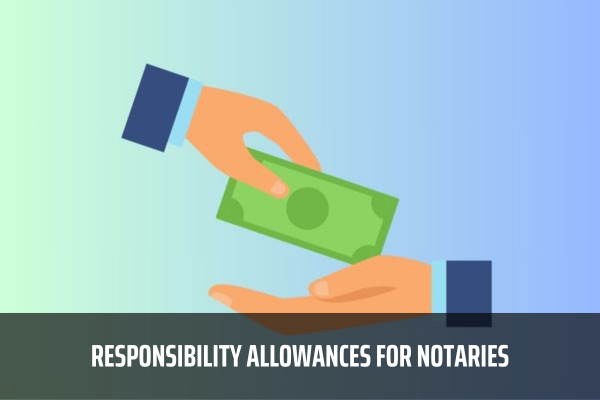What are the changes of responsibility allowances for notaries after 2024 salary reform in Vietnam?
What are the changes of responsibility allowances for notaries after 2024 salary reform in Vietnam?
The National Assembly conducted a vote to pass the Resolution on the state budget estimate for the year 2024 on the morning of November 10. Accordingly, the Resolution recommends implementing comprehensive salary policy reforms from July 1, 2024, in accordance with Resolution 27-NQ/TW of 2018.
Under Resolution 27-NQ/TW of 2018, the following allowances are unified:
II- DIRECTIVES, OBJECTIVES, AND CONTENT OF THE REFORM
...
3. Reform content
3.1. For officials, public employees, and armed forces (in the public sector)
...
d) Rearrange the current allowances, ensuring that the total allowance fund accounts for a maximum of 30% of the total salary fund
...
- Merge profession-specific allowances, responsibility allowances, and hazardous allowances (collectively referred to as profession-specific allowances) applicable to officials and public employees in professions or occupations with higher labor conditions than normal and appropriate preferential policies of the state (education and training, healthcare, courts, prosecution, civil enforcement of judgments, inspection, examination, auditing, customs, forestry inspection, market management,...). Merge special allowances, attraction allowances, and long-term mission allowances in economically and socially challenging areas into mission allowances in particularly difficult areas.
...
Therefore, when implementing the 2024 salary reform, notaries working in the Notary bureaus will not, in principle, have their responsibility allowances reduced. However, responsibility allowances will be merged with profession-specific allowances and hazardous allowances, resulting in the "loss of name" for responsibility allowances and their transformation into profession-specific allowances.

What are the changes of responsibility allowances for notaries after 2024 salary reform in Vietnam?
What are the current responsibility allowance levels for notaries in Vietnam?
Pursuant to the provisions of Article 1 of Decision 27/2012/QD-TTg, the scope and application of responsibility allowances are as follows:
Scope and application
1. This Decision regulates the regime of responsibility allowances for Executing Officers, Adjudicators, and Execution Clerks working in civil enforcement agencies and civil enforcement management agencies under the Ministry of Justice; notaries working in Notary bureaus.
...
In addition, Article 2 of Decision 27/2012/QD-TTg also stipulates the following regarding responsibility allowances:
Level of responsibility allowances
The regime of responsibility allowances is calculated as a percentage of the enjoyed salary plus leadership position allowances and seniority allowances beyond the framework (if any) as follows:
1. The level of 15% applies to Senior Adjudicators in execution and notaries.
2. The level of 20% applies to Senior Executing Officers, Chief Adjudicators in execution, Execution Clerks, and Intermediate-level Execution Clerks.
3. The level of 25% applies to Intermediate-level Executing Officers and Adjudicators in execution.
4. The level of 30% applies to Primary-level Executing Officers.
Therefore, according to the current regulations, notaries working in Notary bureaus are entitled to a responsibility allowance level of 15%.
What are 02 new payrolls applicable to officials and public employees after salary reform in Vietnam in 2024?
Pursuant to Resolution 27-NQ/TW of 2018, the following 02 payrolls are unified:
(1) Payroll for officials and public employees holding leadership positions (elected and appointed) in the political system from central to communal level, based on the following principles:
- The salary level must reflect the hierarchy in the political system; those holding leadership positions receive salaries corresponding to their positions. If one person holds multiple positions, they receive the highest salary level for those positions. If two leaders hold equivalent positions, they receive the same salary level. The salary level of higher-level leaders must be higher than that of lower-level leaders.
- A salary level is prescribed for each equivalent position; there is no categorization of ministries, sectors, committees, commissions, and their equivalents at the central level when designing the central-level payroll. Different salary levels for the same leadership position based on the classification of administrative units at the local level are implemented through allowances.
- The classification of equivalent leadership positions in the political system for payroll design is determined by the Politburo after reporting to the Central Executive Committee.
(2) Payroll for specialized and professional positions based on the officials' career groups and public employees' professional titles, applicable to officials and public employees who do not hold leadership positions. Each career group for officials and professional title for public employees has multiple salary levels based on the following principles:
- Same complexity of work corresponds to the same salary level.
- Higher labor conditions and occupational benefits are implemented through professional allowances.
- Rearrangement of career groups and number of levels within career groups for officials and professional titles for public employees, encouraging officials and public employees to improve their professional expertise.
- Appointment to an officials' career group or professional title must be linked to the job position and the career group and professional title structure implemented by the managing agency or organization.
LawNet